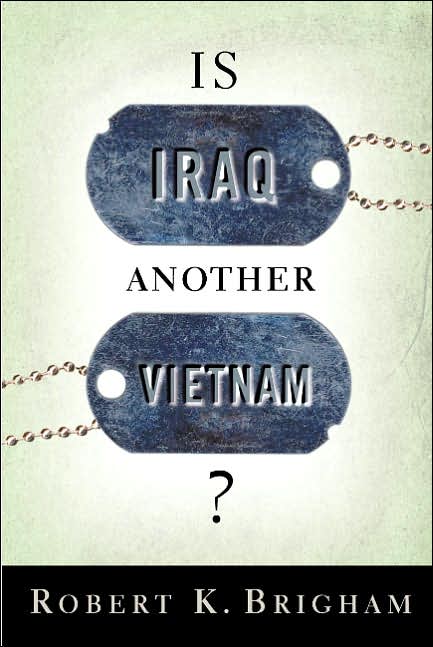Robert K. Brigham: Is Iraq Another Vietnam? Historian Robert Brigham Speaks Out
He's co-authored a book with Robert McNamara and was the first Western scholar to be given access to the archives in Hanoi, so it isn't surprising to learn that Vassar historian Robert K. Brigham sees parallels between Vietnam and Iraq. But he fairly shocked a small audience in Seattle today when he claimed that Condoleezza Rice is following in the footsteps of Henry Kissinger in Iraq, reversing the course of Bush administration foreign policy 180 degrees. Neo-con ideology is out, Metternich is in.
 Brigham, who shared his perspective with scholars at the Army War College last Friday, says that Secretary of State Rice has adopted a Kissingerian 19th century balance-of-power approach to Iraq starkly at odds with the administration's democratic rhetoric in the first term. It's 1815 again, he says, referring to the Congress of Vienna, with Condoleezza Rice playing the part of Austrian Foreign Minister Metternich. Brigham's thesis is that Rice apparently has decided that the only way out of Iraq is for the United States to work covertly in league with Iran and Syria in the hope that they can control the chief groups of insurgents. In exchange for their help, he says, Rice is likely promising Iran and Syria through back channels the chance to become regional major players with American help.
Brigham, who shared his perspective with scholars at the Army War College last Friday, says that Secretary of State Rice has adopted a Kissingerian 19th century balance-of-power approach to Iraq starkly at odds with the administration's democratic rhetoric in the first term. It's 1815 again, he says, referring to the Congress of Vienna, with Condoleezza Rice playing the part of Austrian Foreign Minister Metternich. Brigham's thesis is that Rice apparently has decided that the only way out of Iraq is for the United States to work covertly in league with Iran and Syria in the hope that they can control the chief groups of insurgents. In exchange for their help, he says, Rice is likely promising Iran and Syria through back channels the chance to become regional major players with American help.
This approach makes a certain amount of sense, he says, noting that both countries might hope to follow the example of China, whose economy began skyrocketing after detente with the United States in the 1970s. Nodding his head in wonderment he observed several times that China's per capita income has quadrupled since the 1970s. If Iran and Syria could achieve similar results their regimes could hope to remain in power forever.
But he also expressed reservations about Rice's old-fashioned approach, noting that it may not be possible for Iran and Syria to control the non-state actors in Iraq. It's not clear he said that we know nearly enough about the insurgents as we should to follow this course. While a deal could be struck with them if their end game is to run a government, no deal may be possible if they have some other goal in mind. And the sad fact is American intelligence is so weak in Iraq that the United States government doesn't really know what the insurgents want.
In all events a democratic Iraq is now an unlikely possibility. The best the United States may be able to hope for is a "decent interval" between the time we draw down our forces in Iraq and Syria and Iran become dominant there. He asked point blank if this is Secretary of State Rice's limited goal now. If so, it's Vietnam all over again. As Brigham recounted, Henry Kissinger in the 1970s concluded that because American popular support for the Vietnam War was declining the United States could not win. The solution therefore was to ask Moscow and Beijing for help in restraining North Vietnam while the United States slowly began the withdrawal of American forces. Kissinger always denied asking the Soviets and the Chinese for help in arranging a "decent interval." But documents released in the last year confirm that he did, says Brigham. Chinese leader Chou En-lai asked Kissinger how long a period this decent interval needed to last. Eighteen months, said Kissinger. And that is precisely how long the North Vietnamese waited before beginning their final push to conquer South Vietnam, Brigham noted.
Bob Woodward recently reported in State of Denial that Kissinger has become one of President Bush's chief advisors. Woodward has concluded this means the president plans to follow Kissinger's oft-stated Vietnam line that we should fight until victory. Brigham says Woodward needs to go back and read some history books. He'd discover that while Kissinger was telling the American public that victory in Vietnam was essential, he was secretly arranging to allow North Vietnam to retain 100,000 troops in the South after the United States withdrew, a provision that turned up in the Paris peace accords. That, says Brigham, doesn't sound like victory.
Brigham, who is friends with Bob McNamara and the author of the recently published book, Is Iraq Another Vietnam?, admits there are thousands of ways Iraq and Vietnam are different. But he says he's struck by several parallels. The strategy of clearing and holding ground is the same as in Vietnam. The rhetoric is the same; we will stand down as Iraqis stand up is classic Vietnam talk. And likely as not this war will end in failure as Vietnam did, with similar resulting recriminations in America for a generation.
The economic consequences could also be equally devastating. Remember the bad economy of the 1970s? It's coming, he predicted. Once again we have acted as if we could have both guns and butter. But by another economic measure the wars are dissimilar. Vietnam in inflation-adjusted dollars cost roughly half a trillion dollars over a period of twenty years. Iraq has cost more than that in less than four.
Related Links
